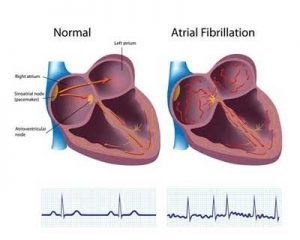- Home
- Editorial
- News
- Practice Guidelines
- Anesthesiology Guidelines
- Cancer Guidelines
- Cardiac Sciences Guidelines
- Critical Care Guidelines
- Dentistry Guidelines
- Dermatology Guidelines
- Diabetes and Endo Guidelines
- Diagnostics Guidelines
- ENT Guidelines
- Featured Practice Guidelines
- Gastroenterology Guidelines
- Geriatrics Guidelines
- Medicine Guidelines
- Nephrology Guidelines
- Neurosciences Guidelines
- Obs and Gynae Guidelines
- Ophthalmology Guidelines
- Orthopaedics Guidelines
- Paediatrics Guidelines
- Psychiatry Guidelines
- Pulmonology Guidelines
- Radiology Guidelines
- Surgery Guidelines
- Urology Guidelines
Cardiology Update: Elevated cancer risk among women with new-onset atrial fibrillation

Among nearly 35,000 initially healthy women who were followed-up for about 20 years, those with new-onset atrial fibrillation had an increased risk of cancer, according to a study published online by JAMA Cardiology.
Atrial fibrillation (AF), the most common cardiac arrhythmia, is associated with an increased risk of major cardiovascular complications. A substantial proportion of patients with AF die of noncardiovascular causes, and recent studies suggest a link between AF and cancer. An increased risk of malignant cancer would be of substantial public health importance given the high prevalence and associated costs of both disorders.
In a study, David Conen, M.D., M.P.H., of University Hospital, Basel, Switzerland, and colleagues included a total of 34,691 women 45 years of age or older and free of AF, cardiovascular disease, and cancer at study entry, who were followed up between 1993 and 2013 for incident AF and malignant cancer within the Women's Health Study, a randomized clinical trial of aspirin and vitamin E for the prevention of cardiovascular disease and cancer.
During follow-up, new-onset AF and malignant cancer were confirmed among 1,467 (4.2 percent) and 5,130 (14.8 percent) participants, respectively. The median age at baseline among participants with new-onset AF and new-onset cancer during follow-up was 58 years and 55 years, respectively. Analysis indicated that new-onset AF was a significant risk factor for the subsequent diagnosis of incident cancer, even after extensive adjustment for various factors. The relative increase in risk was higher within 3 months of new-onset AF, but more modest elevations in risk persisted in the long term, and a trend toward an increased risk of cancer death was observed. Of the cancer subtypes examined, AF was most strongly associated with colon cancer. In contrast, among women with new¬onset cancer, the risk of AF was increased only within the first 3 months but not thereafter.
"Shared risk factors and/or common systemic disease processes might underlie this association," the authors write. "Future studies are needed to assess the mechanisms underlying this association and to determine whether a diagnosis of AF incrementally adds to existing cancer risk prediction algorithms. Regardless, optimal risk factor control in patients with AF seems prudent."
Editorial: Association of Atrial Fibrillation and Cancer
"This provocative work raises both clinical and research questions," write Emelia J. Benjamin, M.D., Sc.M., of the Boston University Schools of Medicine and Public Health, and colleagues in an accompanying editorial.
"Clinically, should a diagnosis of AF prompt a search for occult cancer? Several factors argue against routine screening, including the low absolute risk of cancer and the potential cost and burden of cancer screening. Similar to the literature regarding screening in cases of unprovoked venous thromboembolism [blood clots], based on available data, cancer screening beyond standard routine health care is currently not merited with a new diagnosis of AF."

Disclaimer: This site is primarily intended for healthcare professionals. Any content/information on this website does not replace the advice of medical and/or health professionals and should not be construed as medical/diagnostic advice/endorsement or prescription. Use of this site is subject to our terms of use, privacy policy, advertisement policy. © 2020 Minerva Medical Treatment Pvt Ltd